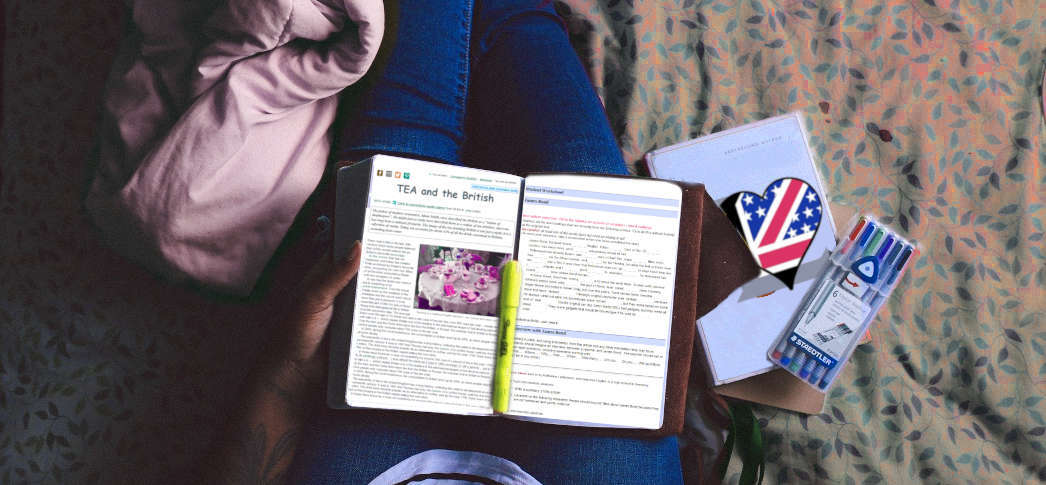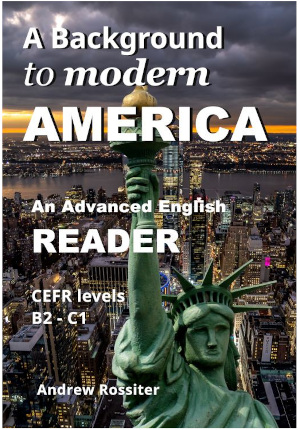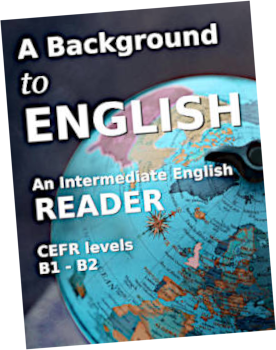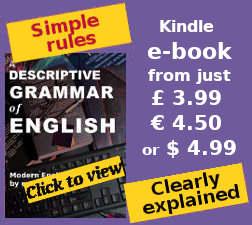Making the most of written texts in the English class
Reading techniques are core skills that need to be mastered by students learning English in the context of EFL and ESL.
| Index : | The classic approach to reading comprehension | Ten
more ideas for
working with written texts |
►
Find comprehension texts
that illustrate
a particular point of grammar, or are accompanied by a particular type
of exercise/activity, for instance MCQs or plain comprehension
questions. See
► Thematic
exercise and classroom activity index for advanced English
reading texts and
► Grammar
and activity index for intermediate texts.
Approaching the written text -
The classic reading comprehension
technique
Reading
comprehension – the ability to understand a written text – is one of
the core skills required for certification by most of today's
internationally accredited English language tests, such as TOEIC, TOEFL
and the Cambridge first certificate, advanced, and proficiency
qualifications. As such, its
importance cannot be underestimated.It can even be argued (contrary to popular perception) that in EFL (more so than for ESL) reading skills are THE core skills required for successful mastery of English... at least with those many language learners who are liable to have more contact with English in a professional context than for talking.
For the purposes of machine marking or rapid marking, comprehension exercises presented in the context of exams or test papers are nowadays largely reduced to multiple choice questions (MCQs).
However while classic multiple choice questions are very widely used used for testing purposes because marking them is very quick and simple, and can even be done by computer, they are by no means the only way of testing students' comprehension of a document, and they are certainly not the only, nor even the best, way of using texts in a learning, rather than a testing, context. There are many kinds of comprehension exercises and activites, as outlined below.
"Comprehension" is thus an activity that can be used for two quite different purposes, which are all too often confused :
- learning - developing students' abilities to read and understand a written text and its vocabulary,
- testing - testing students' understanding of a written text .
In practical terms, when comprehension activities are being used as a learning technique, rather than a testing technique, the first stage of comprehension involves reading a document at least three times, often in different ways. The three basic ways of reading a document are: a) individual silent reading, b) teacher reading or playing the document to the class, and c) students reading the document out loud, taking turns.
Each method has its advantages; but combined in succession, the result should be even better. Many teachers find it hard to know what to do during the silence that reigns (hopefully) when students are asked to silently read an article which may take them five to eight minutes, even more. For this reason, it is often best to begin any reading comprehension task, by asking students to read an article at home or by themselves, before coming into class. The teacher can then be more usefully employed piloting students through the two other stages of the reading process - students reading the document in turn, and finally the teacher reading the whole document back to the class.
Between the different reading stages, students and teachers can explore and elucidate any vocabulary and grammar issues, so that by the time the teacher makes the final reading, the document and its content are now familiar, and the main difficulties have been ironed out.
The above procedure can be applied to virtually any reading resource ; but it is just a start. There are many more ways of getting extra value out of a written document, and by doing so developing students' skills not just in comprehension, but in expression, memory, grammar, deduction, and a lot more.
What to do next depends on the nature, the difficulty and the content of each document. It will also depend on the type of learners, and the classroom context. Reading, by itself, is just the first part of any use of written documents in the English class.
Each article in the Linguapress archive comes with one or more - sometimes several - classroom exercises or activities. These include cloze or multiple-choice exercises which can either be used for general classroom presentation on a connected screen or whiteboard, or be used individually by students on their computer or phone. See thematic exercise index to choose advanced EFL texts in function of specific classroom activities.
Here are some more ways to make best use of written documents in the English class.
Ten more ideas for working with articles and stories in class.
Here is a list of different ways of working with articles and stories in the language class. Each is suggested as a classroom exercise activity for one or more of the free online ESL / EFL resources in the Linguapress archive; but each can be suitably used with many other articles.Working with a connected whiteboard or projector. Many of the ideas below can be more effective when used with a connected whiteboard or screen on which the text and or exercises can be projected. Any article in the Linguapress collection can be projected onto a screen for classroom use; a growing number of these articles are now accompanied by interactive exercises (including dropdown multiple-choice exercises) that can be used to great effect on a screen or whiteboard, and even more effectively using a smartboard. Exercise types that can be used effectively on a classroom screen or whiteboard are marked 💡
- Paused reading: (after students have already been through a text at least twice) Students close their books or cover the printed copy of the article; the teacher then starts reading a text out loud, but pauses at significant points (grammar points, content points, or just shortly before the ends of clauses) and asks students to shout out the next few words from memory. This activity may need management, specially if one or students with good memories start to monopolise the proceedings. ► See an example
- Blank
fill exercises. 💡 (Cloze
exercises) Where not
already suggested and included in Linguapress article
worksheets, these can easily be prepared by the teacher, using a simple
copy and paste of text from the original article, into a new word
processing document. Cloze exercises can either be based on
useful vocabulary, or gramatically based - for instance by removing all
the auxiliaries or modals from a text, or all the articles ( the, a, an, any, some,
Ø (no article) ). But take care ! Cloze exercises need to
be carefully thought out so that a) there is only one correct answer in
each case, and b) they serve some purpose. For instance,
cloze exercises that just test common sense may not do much to test -
nor develop - students' command of English. Cloze exercises are a key
ingredient of Cambridge FCE (B2) and CAE (C1)
testing.
► See an example - Replace the endings. 💡 Another type of cloze exercise, which is used in Cambridge under the heading word formation. Instead or removing words from the document, the teacher removes all or most of the suffixes or functional endings from part of a document that students have studied. Endings to be removed can be verbal (ed, ing, s, Ø (no ending needed) ), or nominal/ adjectival/ adverbial (-al, -ous, -ment, -ing, -ly, etc). ► See an example
- Question forming. 💡 Select half a dozen short sentences in an article, and have students write correctly formed questions to which each of these sentences could be the answer. Example. if you choose the sentence "Barack Obama was born in Honolulu in 1961.", then the questions could be "Where was Barack Obama born?", "What year was Barack Obama born?" and so on. ► See an example
- Condensing - précis writing. Have students produce a shorter version of the article they have been reading. This can take many forms; the basic task is to reduce an article to a given fraction (quarter, half, etc.) of its original length. A more demanding task can be to ask students to reduce part of a text to exactly a given number of words. For example, take a paragraph with 150 words, and get students to reduce it to exactly 75 words. Done in pairs, this can also be a good way to get students to negotiate the fine points of expression.
- Working backwards; the original interview. Many articles in the press or media are written after a journalist or writer has been talking to an expert or the witness to an event. With suitable articles, students can be invited to reconstitute an interview from information given in the article. This is a good activity for students working in pairs, and can be followed, if classes are not too large, by students acting out their sketches.
- Multiple
choice exercises. 💡 These
are pretty classic
exercises, that accompany a lot of EFL texts on a multitude of online
sites;
sadly they are often very poorly thought out. MCQs should
neither be too stupid nor too complicated. An MCQ which asks:
"Donald Trump was born in... a) 1496, b) 1694, c)
1946" does not test reading comprehension skills, just common sense or
maybe
general knowledge. Conversely, good MCQs should be answerable
without calling into use information or knowledge that students may
have acquired outside the language class. Vocabulary based
MCQs should be designed to check students' acquired
vocabulary, and check their ability to read logically.
For example, the following sentence includes a word that is probably new to students, the word invaluable. "The thieves stole three paintings, notably an invaluable portrait of Jan Hoots, by Rembrandt." A good MCQ would be: Invaluable means: a) without value, b) of medium worth, c) of great value. The key to choosing the right answer is the student's ability to understand the role and meaning in the sentence of the word notably. A poor MCQ would be a) ancient, b) incredible c) expensive. In this case, logically all three answers could be right; the only thing that this MCQ choice tests is the reader's acquired vocabulary. ► See an example - True or false :💡 the teacher will produce a number of statements based on the article, some of which are true, according to the article, others of which are false. Students read the article and determine which of the statements are true. Extended version of this; students must justify their answers.
- Punctuation exercise. 💡 The teacher copies part of a text that students have already read, but removes all the punctuation (not forgetting to remove capital letters). Students have to replace the punctuation so that the text again reads coherently. Note that this does not necessarily mean reconstituting exactly the same punctuation as the original text. Variants may well be possible. This is a little-used exercise but one that is very valuable. Sadly, many students, even at advanced level (including PhD students) , seem to believe that punctuation is an optional extra. ► See an example
- Correct the errors. 💡 While some teachers maintain that students should never be presented with any text containing errors, doing so has plenty of advantages. Checking for errors makes students read words very carefully, and pay attention to all sorts of points. For creative teachers, correct-the-errors exercises can bring humour into the classroom, and humour is an excellent teacher. The big pitfall to avoid with error correcting exercises, is that students remember the errors rather than what is right. Error-correcting exercises can encourage students to look at their own writing more carefully. This is proof-reading in an elementary state. ► See an example
 Copyright
LInguapress.com . If
you want to share this article with other teachers, please note that it
a copyrighted
teacher resource. You are welcome to link to it from Facebook, from
your blog, website
or school website, but do not copy it. A clickable link is quite
sufficient for sharing with others.
Copyright
LInguapress.com . If
you want to share this article with other teachers, please note that it
a copyrighted
teacher resource. You are welcome to link to it from Facebook, from
your blog, website
or school website, but do not copy it. A clickable link is quite
sufficient for sharing with others.Website
and texts © Linguapress.com 2009 - 2022 except where otherwise
indicated
Contact: Use the form on our get in touch page
Contact: Use the form on our get in touch page






